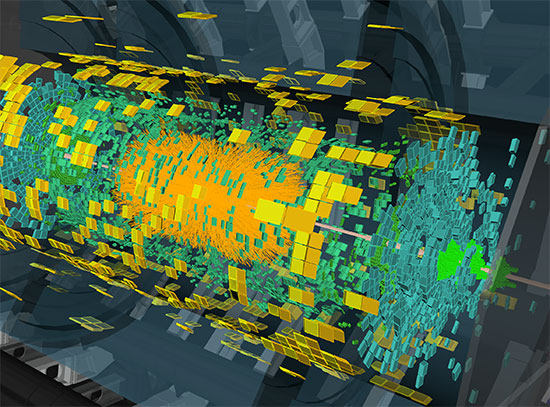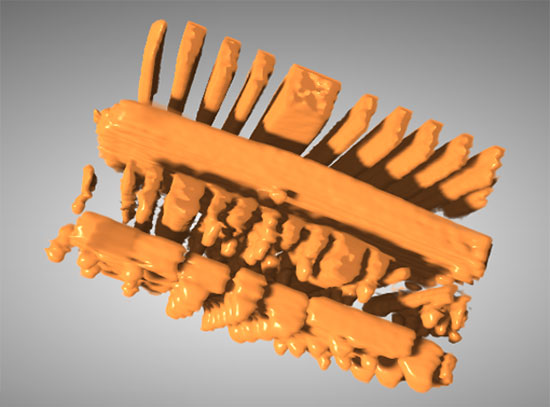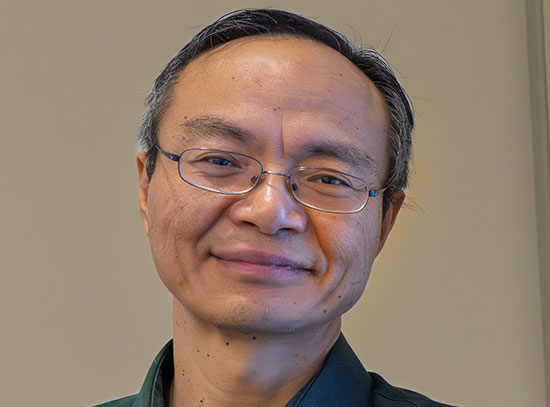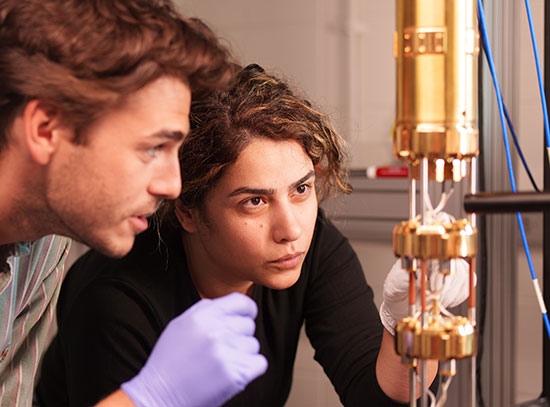First African School of Physics brings cutting-edge physics and technology to sub-Saharan Africa
July 29, 2010
The following press release is being distributed by the InterAction Collaboration, whose members represent the world's particle physics laboratories in Europe, North America and Asia, including the U.S. Department of Energy’s Brookhaven National Laboratory. Brookhaven is one of 13 institutions that is administering and supporting the first African School of Physics at the National Institute of Theoretical Physics in Stellenbosch, South Africa. Brookhaven physicist Ketevi Assamagan, who was born in the West African nation of Togo and works on the ATLAS experiment at CERN’s Large Hadron Collider, is on the school’s international organizing committee and also is a lecturer. For more information about Brookhaven’s involvement, contact Kendra Snyder at ksnyder@bnl.gov or 631-344-8191.
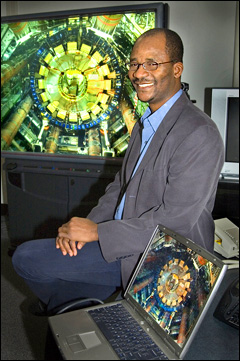 enlarge
enlarge
Brookhaven physicist Ketevi Assamagan, who was born in the West African nation of Togo and works on the ATLAS experiment at the LHC, is a lecturer and member of the school’s international organizing committee.
This August, students and scientists from African countries will get the rare opportunity to learn about innovative physics experiments, accelerators and technology on their own continent.
The first African School of Physics will take place August 1-21 at the National Institute of Theoretical Physics in Stellenbosch, South Africa. Fifty-nine students — including 40 from 17 African countries — will take part in the program, learning about theoretical and experimental physics from leading international scientists. Most of the students are pursuing or have completed advanced degrees in physics, but lack opportunities to gain specialized knowledge in subatomic physics. The trip and expenses for all African students are paid for by the school, which is supported by 13 international institutions.
"This may be the first opportunity these students have to learn about particle and nuclear physics," said Steve Muanza, a physicist at France’s CNRS/IN2P3 and the co-founder and director of the school. "We hope that the material presented at the school piques their interest and they go on to pursue these topics."
Topics to be covered include current and future particle and nuclear physics experiments, theoretical physics, particle accelerators and technology, information technology and grid computing. Simon Connell, a member of the local organizing committee, believes that the intensive three-week program could equate to a semester-long university course.
"We will cover a lot of subject matter not taught at any university in Africa," Connell said. "Students can take the knowledge they learn here back to their home institutions, where they can continue researching and teaching. We don't expect the benefits of the school to stop when they leave."
Students won’t be limited to lecture halls. A videoconference with the CERN particle physics laboratory in Geneva, Switzerland, will link students with physicists operating the Large Hadron Collider from CERN’s Control Centre for accelerators. Students will also spend one afternoon at iThemba LABS, an accelerator facility in South Africa, practicing laboratory experiments and learning about how particle physics and its associated technologies can apply to other fields, including medicine.
“The lessons in these final days of the school will help students link the concepts they've learned to the real world," said Fermilab scientist Christine Darve, head school organizer.
One school participant, Petrus Bompere, is a nuclear inspector at the National Committee for the Protection against Ionizing Radiations in the Democratic Republic of Congo. He received his license and graduate degree in physics from the University of Kinshasa in the Democratic Republic of Congo, and hopes to apply his new knowledge to his job in national security.
Another participant, Eno Ituen, a senior lecturer and former physics department head at the University of Uyo in Akwa Ibom, a state in Nigeria, anticipates connecting with experts in the field.
This year’s school takes place in South Africa, the first African country to become a member of an experiment at CERN’s Large Hadron Collider. Organizers hope this will be the start of a tradition, and plan to host the school every two years.
The school is administered and supported by the following institutes: Abdus Salam International Centre for Theoretical Physics (ICTP), Trieste, Italy; Brookhaven National Laboratory, New York, USA; Commissariat a l’énergie atomique (CEA), France; Ecole Polytechnique Federale de Lausanne (EPFL), Lausanne, Switzerland; European Organization for Nuclear Research (CERN), Geneva, Switzerland; Fermi National Accelerator Laboratory (Fermilab), Illinois, USA; Centre National de la Recherche Scientifique (CNRS), Institut National de Physique Nucléaire et de Physics des Particules (IN2P3), and Institut des Grilles, France; National Institute for Theoretical Physics (NITheP), Stellenbosch, South Africa; National Research Foundation (NRF), South Africa; Spanish Agency for International Cooperation and Development, Minister of Foreign Affairs (AECID), through the University of Santiago de Compostela; Paul Scherrer Institute (PSI), Villigen, Switzerland; Thomas Jefferson National Accelerator Facility and Jefferson Science Associates, Virginia, USA. For more information and photos, visit the first African School of Physics website.
Media contacts:
African School of Physics Organizing Committee Christine Darve, head organizer, Fermi National Accelerator Laboratory, +41 76 487 2504, darve@fnal.gov
Simon Connell, local organizer, National Research Foundation of South Africa, +27 82 945 7508, shconnell@uj.ac.za
Steve Muanza, school director and co-founder, CNRS/IN2P3, +33 4 91 82 72 75, muanza@in2p3.fr
Supporting institutions
Abdus Salam International Centre for Theoretical Physics (ICTP), Trieste, Italy
Mary Ann Williams, +39 040 2240 603, mwilliams@ictp.it
Brookhaven National Laboratory, Upton, New York, USA
Kendra Snyder, +1 631 344-8191, ksnyder@bnl.gov
Commissariat a l’énergie atomique (CEA), France
Sophie Cavata, +33 1 69 08 91 65, sophie.kerhoas-cavata@cea.fr
Ecole Polytechnique Federale de Lausanne (EPFL), Lausanne, Switzerland
Giorgio Margaritondo, +41 21 69 34471, giorgio.margaritondo@epfl.ch
European Organization for Nuclear Research (CERN), Geneva, Switzerland
Renilde Vanden Broeck, +41 22 76 72141, press.office@cern.ch
Fermi National Accelerator Laboratory (Fermilab), Batavia, Illinois, USA
Kurt Riesselmann, +1 630 840-3351, kurtr@fnal.gov
Institut National de Physique Nucléaire et de Physics des Particules (IN2P3), France Perrine Royole-Degieux, +33 4 73 40 54 59, royole@in2p3.fr
National Institute for Theoretical Physics (NITheP), Stellenbosch, South Africa
Rene Kotze, +27 21 808 2653, renekotze@sun.ac.za
National Research Foundation (NRF), South Africa
Palesa Mokoena, +27 (0) 12 481 4058, palesa.mokoena@nrf.ac.za
Paul Scherrer Institute (PSI), Villigen, Switzerland
Dagmar Baroke, +41 56 310 2916 dagmar.baroke@psi.ch
Spanish Agency for International Cooperation and Development, Minister of Foreign Affairs (AECID), through the University of Santiago de Compostela
Beatriz Sempere Serrano, beatriz.sempere@usc.es
Thomas Jefferson National Accelerator Facility and Jefferson Science Associates, Newport News, Virginia, USA
Dean Golembski, +1 757 269-7689, deang@jlab.org
2010-11163 | INT/EXT | Newsroom




